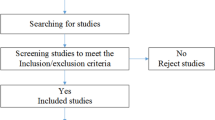Abstract
Australia's changing political, social and economic agendas have triggered a critical analysis of school curriculum. Part of this consideration has been concern over the future of science education within the context of senior schooling. Following the completion of the Senior Science Future Directions Project commissioned by the Queensland Board of Senior Secondary School Studies, fifteen issues were identified. These issues, grouped by the needs of the science disciplines, society and the individual student, are discussed with the view of understanding the future design of senior science syllabuses.
Similar content being viewed by others
References
Beasley, W., Butler, J. & Satterthwait, D. (1993).Senior Sciences Future Direction Project: Final Report. Brisbane: Board of Senior Secondary School Studies.
Collins, C. (1992). The changing nature of the academic curriculum. In T. Seddon & C.E. Deer (Eds.)A curriculum for the senior secondary years. Hawthorn, Vic.: Australian Council for Educational Research.
Feldman, A. & Atkin, J.M. (1993). Research in science education in the USA.Journal of Curriculum Studies, 25, 281–289.
Fisher, A. (1992, September). Why Johnny can't do science and math.Popular Science, 50–55.
Fort, D.C. (1993). Science shy, science savvy, science smart.Phi Delta Kappan, 74, 675–683.
Harding, S. (1991).Whose science? Whose knowledge? Ithaca, N.Y.: Cornell University Press.
Jenkins, E.W. (1992). School science education: towards a reconstruction.Journal of Curriculum Studies, 24, 229–246.
Pomeroy, D. (1993). Implications of teachers' beliefs about the nature of science: comparison of the beliefs of scientists, secondary science teacher, and elementary teachers.Science Education, 77, 261–278.
Posner, G. J. (1992).Analyzing the curriculum. New York: McGraw-Hill, Inc.
Wheeler, D. (1967).Curriculum process. London: Hodder & Stoughton.
Author information
Authors and Affiliations
Additional information
Specializations: biology teacher education, science curriculum development.
Specializations: professional development, curriculum design and evaluation.
Specializations: professional development, science teaching.
Rights and permissions
About this article
Cite this article
Satterthwait, D., Butler, J. & Beasley, W. Emerging issues concerning the future directions of Australian senior science education: The Queensland experience. Research in Science Education 23, 252–258 (1993). https://doi.org/10.1007/BF02357068
Issue Date:
DOI: https://doi.org/10.1007/BF02357068




